
The Brittle Paper Literary Awards is our way of recognizing the finest, original pieces of literature by Africans available online for free. We announced it to mark our seventh anniversary. Its five categories—Fiction ($200), Poetry ($200), Creative Nonfiction/Memoir ($200), Essays/Think Pieces ($200), and the Anniversary Award ($300) for writing published by us—reflect our efforts to capture the range and variations of literary dialogue on the continent.
Across these five categories, 48 pieces of writing, each beautifully crafted and thought-provoking, were shortlisted based on their quality, significance and impact.
These are the five winners.
The Brittle Paper Award for Essays/Think Pieces ($200)
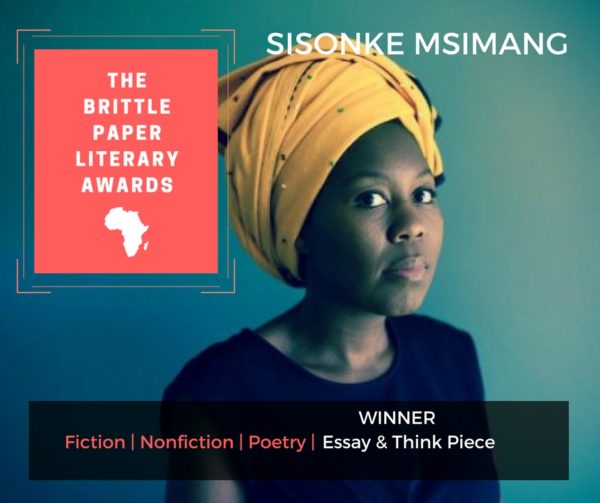
Read: The Brittle Paper Award for Essays/Think Pieces: Meet the Nominees
From a class of essays and think pieces that situate the African writer’s work within global conversations, we chose Sisonke Msimang’s brilliant commentary on black women as figures of intellectual power, “All Your Faves Are Problematic: A Brief History of Chimamanda Ngozi Adichie, Stanning and the Trap of #BlackGirlMagic.” Msimang explores, with the eye of a scholar and pop culture critic, the forces that contributed to Chimamanda Adichie’s dominance in the global imagination. The piece may be about Adichie in subject, but it is also driven by larger questions about how we produce knowledge in the age of social media. Drawing from a wide array of discursive fields— literature, feminism, politics, and fashion—Msimang offers a hard and searing look at how questions of race intersect with global intellectual iconography and social media culture.
“All Your Faves Are Problematic” is published by Africa is a Country, a remarkable intellectual project that has contributed immensely to changing the rules, practices, and conventions on how we produce knowledge about the continent.
The Brittle Paper Award for Fiction ($200)
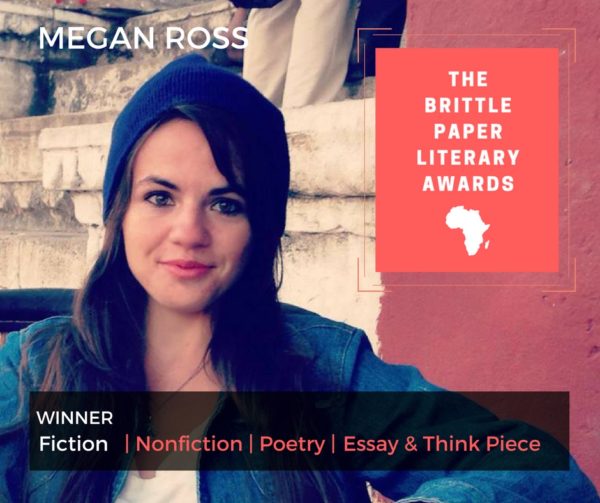
Read: The Brittle Paper Award for Fiction: Meet the Nominees
From a box of ten short stories that range from the startling to the tragic, we chose Megan Ross’s aching romance, “Farang.” A study of intimacy and companionship set in Thailand and South Africa, a reflection on love and language, on foreknowledge and inevitability, “Farang” is wrought in visual prose so lyrical and controlled it moves like a spring. In “Farang,” we witness a dialogue among subject, style, and aesthetic experimentation, but one that is accessible in its complexity.
It is time, also, to salute the unrivaled work that Short Story Day Africa Prize is doing for short fiction on the continent. The prize’s top three entries for 2016, from the collective’s most recent anthology, Migrations, all made our shortlist. The collective has left its mark on the 2010s literary scene, and we are all the better for it.
Read: “Farang”
The Brittle Paper Award for Poetry ($200)
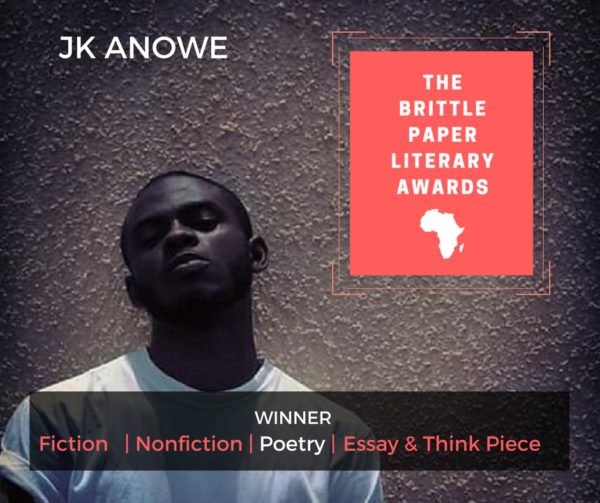
Read: The Brittle Paper Award for Poetry: Meet the Nominees
From a pool of ten poems that range from stylistic daringness to psychological acuity, we chose J.K. Anowe’s thematically deviant, Self-centric “Credo to Leave.” An interrogation of psychological make-up, delivered in a voice grounded in vulnerability and deep existential pain, “Credo to Leave” is an entry point to an emerging sub-tradition in the poetry of Nigeria’s new generation. It is a sub-tradition preoccupied with the visceral, personal, and psychological—internal void, suicidal tendencies, masturbation, sex—with digging into the Self. Pegged in the psyche, its introspection—the focus on speaking into oneself rather than speaking out to the world—is an outlet for a confessional generation not afraid to voice its internal struggles and flaws, to make art of it. Given the emotional and psychological state of its voice, the wording of “Credo to Leave,” the abrupt clarity of it, demonstrates psychological acuity, clinical depression unadorned. “Credo to Leave” is a revolt.
“Credo to Leave” is published by Expound, a magazine that is often a conduit for the development of new talent, but J.K. Anowe’s emergence began from Praxis magazine’s poetry chapbook series. We recognize and applaud here the priceless work that homegrown platforms put in to usher in new voices, particularly as these platforms are themselves run by new voices.
Read: “Credo to Leave”
The Brittle Paper Award for Creative Nonfiction ($200)
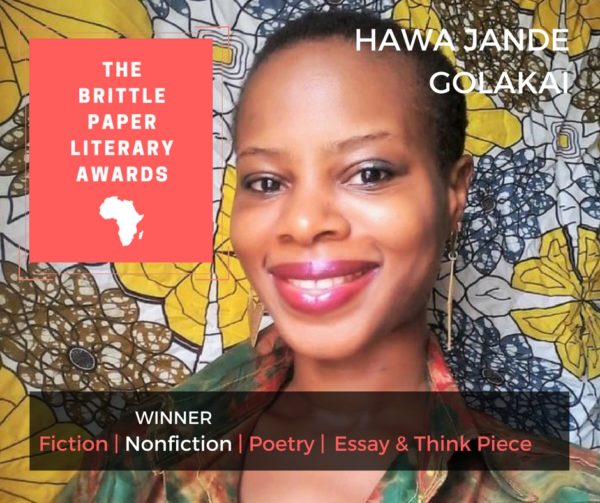
Read: The Brittle Paper Award for Creative Nonfiction/Memoir: Meet the Nominees
From a collection of eight creative nonfiction pieces that range from the explosive to the breathtakingly innovative, we chose Hawa Jande Golakai’s witty rebuttal to stereotypes, “Fugee.” An affecting interrogation of the Ebola crisis in Liberia, as well as of identity and the life of an artist-cum-clinical scientist, “Fugee” is delivered in a beguiling blend of humorous, quotable, often-lyrical sentences. Golakai documents one of the most precarious moments for the African continent with the seriousness it deserves but also the private, subjective dimension it requires. The essay is the perfect modulation of distance and nearness, pain and humor, social commentary and the confessional. In many ways, “Fugee” exemplifies, in the deftness of its composition and the humaneness of its delivery, Ellah Allfrey’s notion of a “specifically African genre of creative nonfiction.”
“Fugee” is available to read for free on Granta.com, but it was originally published in Safe House, a groundbreaking nonfiction collection edited by Ellah Allfrey.
Read: “Fugee”
The Brittle Paper Anniversary Award ($300)
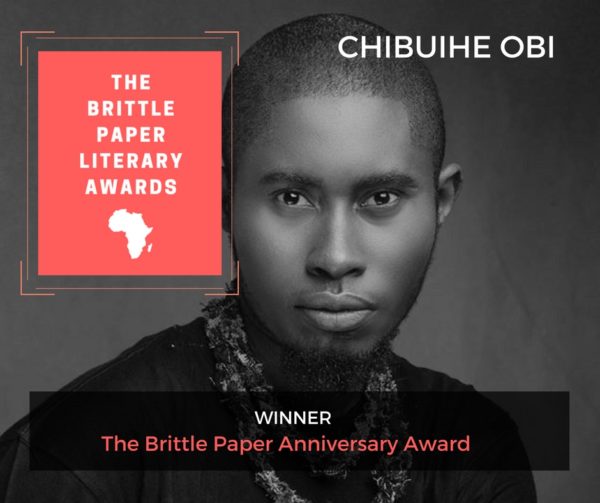
Read: The Brittle Paper Anniversary Award: Meet the Nominees
From a mix of twelve conversation-driving fiction, poetry and nonfiction published on our site, we chose Chibuihe Obi’s brave, impactful “We’re Queer, We’re Here.” A query into the paucity of Nigerian literature about queerness and an expatiation of the immediate violence that so empowers homophobia, Obi’s work is all the more important given the unfortunate circumstance of his kidnapping—which only strengthens his work’s premise. Published, in a weird coincidence, on May 17, the International Day Against Homophobia, Transphobia and Biphobia, the essay racked up 2,000 views in its first week, and more than 6,000 views in its first five weeks and, five months later, is inching towards 8,000 views, at a rate that might move it into our top-20 most-viewed posts within months.
Read: “We’re Queer, We’re Here”


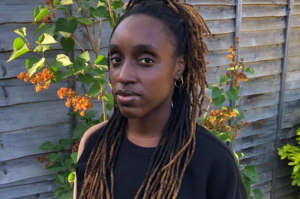



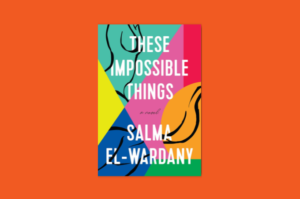


Brittle Paper Literary Awards 2017 winners announced November 06, 2020 15:01
[…] For more about this awards and the winners, please click here. […]